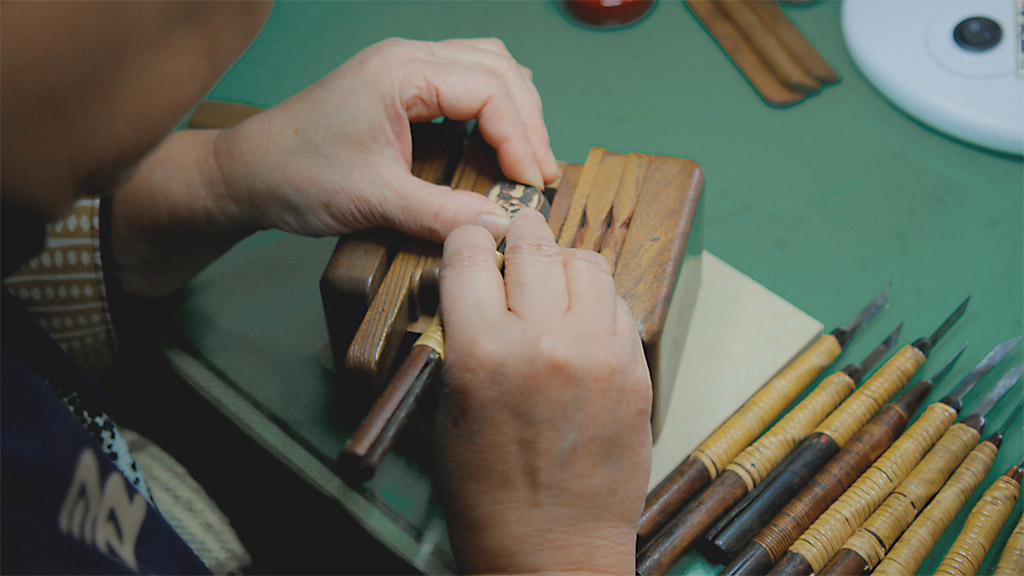[Inkan]
印鑑
日本最古の印鑑は、北九州で発見された「漢倭奴国王」と刻まれた金印で、漢の光武帝が倭奴国王に贈ったとされています。平安時代以降、私印の習慣が見られるようになり、戦国時代には、織田信長などの戦国武将を中心に印鑑を押す風習が定着します。明治になってから、実印を個人の証とした「印鑑登録」が決められ、重要な証文などに押されるようになりました。これが現在の「印鑑登録」の基礎となっています。
Traditional Seals
Japan's oldest inkan, or traditional seal, is a gold seal discovered in Kitakyushu and engraved with the characters “Kan no Wa no Na no Kokuo (King of the Na state of the Wa vassal of the Han Dynasty).” The seal is believed to have been bestowed upon the King of the ancient state of Na in Japan by Emperor Guangwu of the Han Dynasty. Personal seal use has been confirmed as early as the Heian Period, and the practice of affixing one’s seal was established in the Sengoku Period by the feudal lord Oda Nobanaga and others. With the Meiji Restoration in 1868 and the modernization of Japan, “inkan registration,” the registering of an official seal, was adopted as a way of verifying personal identity. It became common to affix this official inkan to important official documents and the like, forming the basis for the contemporary system of personal seal registration in Japan.
印章彫刻師
伊藤睦子
Inkan Seal Engraver
Mutsuko Ito

| 1963年 | 高校卒業後、父親に師事。印章彫刻の道に入る。 |
| 1985年 | 「江戸女職人展」の催事に初めて出展。以来各デパートの催事に出展。「女職人展」も企画・注目を集める。その間各テレビ・新聞・雑誌などに取り上げられる。 |
| 1988年 | 「江戸女職人の会」の会長に就任。 |
| 1996年 | 「台東区優秀技能者」に選定。 |
| 2000年 | 自然木の遊印を考案。(実用新案取得3071071号) |
| 2003年 | 「自然木が面白い 小枝で印づくり」(日貿出版社)を出版。 |
| 2004年 | 「東京都優秀技能者都知事賞」(東京マイスター)に認定。 |
| 1963 | After graduating high school, began studying inkan engraving under her father. |
| 1985 | Displayed her work for the first time under the auspices of the Edo Craftswomen Exhibition. Has since displayed work at various department store exhibits. Her projects with Edo Craftswomen Exhibition have garnered attention as her work has been featured on television and in newspapers and magazines. |
| 1988 | Assumed position of Chairwoman of the Edo Craftswomen Society |
| 1996 | Selected as Outstanding Skilled Worker in Taito Ward |
| 2000 | Devised a novelty seal made from natural wood (Utility Model No. 3071071) |
| 2003 | Published Natural Wood Is Fun: Making Seals with Twigs (Nichibou Publishers) |
| 2004 | Certified as an Outstanding Skilled Worker by the Governor of Tokyo (“Tokyo-meister”) |


インタビュー
高校卒業後、父親の後を継いで、印章彫刻の道を歩み始めた伊藤さん。父から受け継いだ印刀を指先の一部のように使いこなし、何十年も同じように押せる印鑑作りに誇りを持ってきました。しかし時代の波で、印鑑の機械彫りが進んでいくと、ある疑問がわいてきます。印鑑は人生をゆるがす大切なものなのに、味気ないコピーでよいのだろうか…。 そんなとき、知り合いの箒職人から「昔は、お茶の枝で印鑑を作っていた」という話を聞き、「小枝印」のアイディアがひらめきました。小枝印は自然の木に、草花や動物の絵を彫り、その横に名前を入れたもので、銀行印としても使える印鑑。最初は、名前だけを彫っていましたが、知人に頼まれて絵柄を入れたものがお客さんの目に留まり、口コミで広がっていきました。世界に一つの印鑑と評判を呼び、今では、全国からオーダーが来るように。「今後、印鑑の需要は少なくなるかもしれないけれど、小枝印は時代にマッチして生き残っていくんじゃないかしら」。


Interview
Mutsuko Ito began her career in inkan seal engraving when she took up the craft from her father upon graduating high school. She can wield her seal-engraving knife as adeptly as if it were an extension of her fingers, and has taken pride in crafting seals that last for decades. However, the changing tides of time have seen machine-carved inkan fill the market, which has left her wondering: is an insipid carbon copy really good enough for something with such life-defining importance as an inkan?
It was around that time that a broom craftsman acquaintance mentioned to Ito that “They used to make inkan from twigs of tea shrubs,” and the idea for koeda-in, or “twig seals” came to her in a flash of inspiration. These twig seals would be made of natural wood, engraved with images of flora or fauna, and feature the bearer’s name. They could even be used as an official seal for bank transactions. At first, Ito engraved them only with the name of the bearer, but when a seal featuring an illustration—which she had done by special request from an acquaintance—caught the eye of a customer, word spread quickly. These one-of-a-kind twig seals became a hit, and now orders come in from all over the country. Says Ito, “Future demand for inkan may be on the decline, but there’s definitely a demand for twig seals in the modern era so they just might be able to stand the test of time. ”



伊藤印房
Ito-Inbo

店舗情報 / Shop Information :
住所:東京都台東区千束1-19-4
Adress:1-19-4 Senzoku, Taito-ku, Tokyo
電話番号 / Telephone:
03-3873-0489
営業時間 / Hours of Operation:
9:00~18:30
定休日 : 不定休
Closed:Varies
ホームページ / Website:
http://www.ito-inbo.com/instanthp/page01.html![]()








